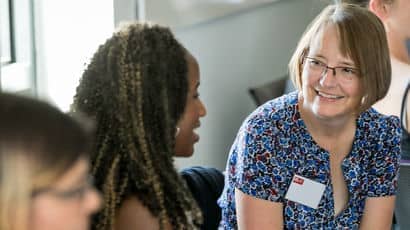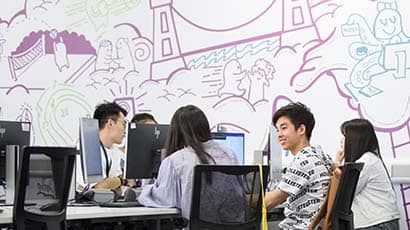Technician Commitment
UWE Bristol is one of the proud founding signatories who have pledged to take action to remove the barriers and face the challenges affecting technical staff
What is the Technician Commitment?
The Technician Commitment is a university and research institution initiative led by a steering group of sector bodies, with support from the Science Council and the Gatsby Foundation.
The Commitment aims to ensure visibility, recognition, career development and sustainability for technicians working in higher education and research across all disciplines.
UWE Bristol is one of the proud founding signatories who have pledged to take action to remove the barriers and face the challenges affecting technical staff. The Commitment has grown significantly and now has more than 120 signatories.
The Commitment includes four key areas:
- Visibility - ensuring that all technicians within the organisation are identifiable and that the contribution of technicians is visible within and beyond the institution.
- Recognition - supporting technicians to gain recognition through professional registration and external awards schemes.
- Career development - enabling career progression opportunities for technicians through the provision of clear, documented career pathways.
- Sustainability - ensuring the future sustainability of technical skills across the organisation and that technical expertise is fully utilised.
UWE Bristol Technician Commitment Action Plan
Read our Technician Commitment Action Plan (PDF) for more information.
"It's a privilege to work with students on their creative journey and in such an inspiring and motivating multi-disciplinary environment as part of a highly creative, technical teaching team."
"I joined the Physical Fabrication Technical team at Bower Ashton campus as part of the School of Arts in 2008, fours year after finishing an MA in Multidisciplinary Printmaking. I’m a practicing artist, working with materials and processes and enjoy working with people and sharing knowledge and practice. And so this role has been a really good fit for me, giving me a space where I have been able to grow and develop as a Technical Instructor.
"It’s a privilege to work with students on their creative journey and in such an inspiring and motivating multi–disciplinary environment and as part of a highly creative, technical teaching team. Our team are constantly exploring the intersection between traditional processes and new technologies and are open minded and forward thinking. We like to experiment and embrace new ways of working. In 2021, I participated in the Herschel’s Women in Leadership programme, which gave me so much insight into the breadth and depth of others working in technical roles across the UK and a space to share experiences and increase my understanding.
"I also work part-time outside of UWE Bristol as an Arts in Health Practitioner, developing my skills in health and community settings, such as hospitals, health centres, schools and care homes – facilitating visual arts sessions for supporting participant wellbeing. This had led me to expand these ways of working at UWE Bristol to support the wellbeing of students and staff. For example, designing and running print club, delivering creative making sessions as part of the health and wellbeing innovation scheme for staff and running sessions for UWE Bristol Living well for students.
"In the last three years, within my technical role, I have been able to pursue starting a research practice at UWE Bristol. I did this through successfully securing funding through the Research Investment Scheme (RIS) and the support and encouragement from my Technical Manager. I have been collaborating on this with another colleague exploring the links between play, wellbeing and creativity for HE students in the School of Arts, creating a ‘Conditions for Play’ manifesto as a tool for students to use in their creative practice.
"I really appreciate the diversity of my technical role, working as part of team, being student facing, involved in teaching and learning and being able to explore potential areas of growth where I can use my skills and be challenged to grow."
"The demands of the role are varied which keeps the work interesting and engaging."
"I have worked at UWE for 22 years – mostly in the Structures Laboratory within the School of Engineering. After completing A levels I embarked on a B.Eng. degree in Mechanical Engineering here at UWE Bristol. Having always been interested in a wide range of subjects within engineering it seemed that this course could provide a broad experience of study with scope to potentially specialise later. My degree included a ‘sandwich year’ in industry working in the automotive sector which provided very useful technical experience and an insight of professional engineering more generally.
"My role in the Structures Laboratory is split between supporting teaching activities in the lab and providing laboratory support for student projects, research and consultancy. The demands of the role are varied which keeps the work interesting and engaging. Some tasks are relatively routine such as basic tensile testing of materials, whereas other aspects are different every day. For example, specialist experimental stress analysis can involve lots of problem solving, specialist design of fixtures and test rigs followed by interesting practical experimental work and ultimately data acquisition and analysis. Supporting lab-based classes can be challenging but is also rewarding when you can see students benefitting from their experience in the lab. Our colleagues and students are great to work with and combined with the interesting work makes the role enjoyable and rewarding.
"I completed my degree as a part-time student whilst recovering from injuries caused in a serious road accident. During my final year I got involved in some research work at UWE Bristol studying kinetic energy storage and recovery using high speed flywheels. Later, when working in the Structures laboratory, I was keen to build on my earlier research work and was able to embark on a part-time PhD whilst still working in the lab. It was a difficult challenge and hard work but I successfully completed the PhD in 2017. The experience of post graduate study gave me valuable experience and I learnt a lot from the whole process. In most aspects of life it is true that we are always learning and this is certainly the case at UWE Bristol"
"The role gave me the opportunity to share my positivity with the students but also to work alongside the academic team to help deliver an inspiring programme of teaching."
"I was a mature UWE Bristol student and completed a Paramedic degree in 2015. When I began my studies in 2013, my children were still dependent teenagers, 2 dogs relied on me, I had 2 part-time jobs and a long commute to campus meant that life was busy and challenging. My university life turned out to be the panacea that was needed.
"I fell in love with Glenside campus. It afforded me a safe space that I thrived in thanks to the support of my fellow students and the staff.
"On graduating, I took up a full-time role with South Western Ambulance Service Trust (SWAST) and was stationed in Somerset.
"In 2020, the COVID pandemic challenged my resilience. I felt harrowed, drained, tired and I recognised that I was heading for ‘burn out’. I was approaching my 50th birthday and felt that night shifts were a constant struggle, so I started to scout out other opportunities.
"I stumbled across the healthcare technician post online, two days before my birthday. I applied because I was a proud alumnus, had enjoyed the rewards of mentoring students and wanted to continue to promote the profession and truthfully because there were no night shifts.
"The technician role offered me a significantly better work/life balance. UWE Bristol allowed me to work four long days to give me the time to still work one day a week in practice. I love being a paramedic and felt trepidation leaving frontline duties completely. My continued clinical practice offers me the opportunity to remain up-to-date not only with clinical decision making, but also to relate to the challenges the students might be facing on placement with the current pressures on the NHS. I’ve been so well supported by my line manager to align both roles.
"The role gave me the opportunity to share my positivity with the students but also to work alongside the academic team to help deliver an inspiring programme of teaching.
"I have been so fortunate to have been promoted twice in the time I have been back at UWE Bristol and recently took up the post of Deputy Technical Manager. This team has without a doubt, been the best I have ever been part of. I have learnt so much from every member. They are a fantastic group of experienced professionals with a wealth of different experience. They are always willing to contribute and celebrate the differences that everyone brings. It has been an absolute privilege to work with them.
"I am currently undertaking a distance learning programme to top up my foundation degree and UWE Bristol have offered me comprehensive management training to support my new role. I feel so proud and indebted to UWE Bristol for the opportunity it has provided to me over the last decade and am very much looking forward to endeavouring to contribute my part to its future success."
You may also be interested in

Work at UWE Bristol
UWE Bristol is proud of its diverse workforce and welcomes new job applicants from all backgrounds and communities.

Why work at UWE Bristol
UWE Bristol provides competitive salaries, excellent career development opportunities and a comprehensive benefits package.

Our values, vision and strategy
Our core purpose, ambition, strengths and values, including details about our Strategy 2030.

Strategy 2030
Strategy 2030's priority is to deliver an outstanding university experience for our students through innovative, practice-led, research-informed courses.
